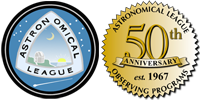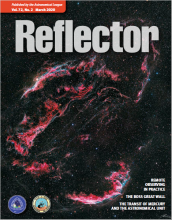ASTRONOMICAL LEAGUE

As a member of SMA you automatically become a member of the Astronomical League. The Astronomical League is an umbrella organization of amateur astronomy societies. Currently their membership consists of over 280 organizations across the United States, along with a number of Members-at-Large, Patrons, and Supporting members.
The mission of the Astronomical League is to promote the science of astronomy by (1) fostering astronomical education; (2) providing incentives for astronomical observation and research; and (3) assisting communication among amateur astronomical societies.
The Astronomical League provides a number of observing awards to members locating and describing certain specified astronomical objects or events. Upon achievement of observing the required number of objects in each category the AL acknowledges the achievement with certificates and pins and reporting in its quarterly periodical, The Reflector.
www.astroleague.org
__________________________________________________________________________________
SMA has partnered with Cornerstones of Science, CoS, helping them with their STAR Program. (Sharing Telescopes and Astronomy Resources) We have modified over 200 ORION Starblast 4.5 inch Reflectors, mounted on an ALT/AZ base for libraries in Maine and other States. SMA provides "hands-on" workshops for these Maine libraries and "Star Parties" for their patrons.
Cornerstones has ordered Orion telescopes for some out-of-state libraries and these are mailed directly to them; i.e., Arizona, Illinois, Michigan, Wisconsin, Massachusetts, Missouri and others. These are supported by their local clubs.
We have modified additional telescopes for out of state libraries and more to follow. Workshops have been provided via Skype and conference calls.
Cornerstones, and the Library Telescope Program, is now in 23 States!
As of: December 9, 2019
We have modified additional telescopes for out of state libraries and more to follow. Workshops have been provided via Skype and conference calls.
Cornerstones, and the Library Telescope Program, is now in 23 States!
As of: December 9, 2019
Cornerstones History
Cornerstones of Science, CoS, began in 1999 as a result of the vision of Dr. Lee Grodzins and his generous grant to the Curtis Memorial Library in Brunswick, Maine. CoS was founded on the belief that, in this rapidly changing world, all members of our communities need to become science and technology literate, to understand the impact scientific and technological advances have on their daily lives. Their mission statement reads, in part:
"Our mission is to connect people with science and technology in ways that stimulate lifelong learning."
For more than a decade, Cos has offered program and resources to partner libraries and provide scientific and technological connections to their patrons and communities. This partnership has grown to 36 libraries and include 32 libraries in Maine and in four other states.
Recently, CoS heard of a successful Telescope program in New Hampshire, supported by the New Hampshire Astronomical Society and Marc Stowbridge. Marc originated the idea of modifying an ORION Telescope and made an easy to use and stable instrument to be checked out by the Library patrons as they would a book. There are over 100 Libraries in NH with at least one Telescope. The program has been so successful, some Libraries are ordering a second Telescope to help shorten the long waiting lists.
"Our mission is to connect people with science and technology in ways that stimulate lifelong learning."
For more than a decade, Cos has offered program and resources to partner libraries and provide scientific and technological connections to their patrons and communities. This partnership has grown to 36 libraries and include 32 libraries in Maine and in four other states.
Recently, CoS heard of a successful Telescope program in New Hampshire, supported by the New Hampshire Astronomical Society and Marc Stowbridge. Marc originated the idea of modifying an ORION Telescope and made an easy to use and stable instrument to be checked out by the Library patrons as they would a book. There are over 100 Libraries in NH with at least one Telescope. The program has been so successful, some Libraries are ordering a second Telescope to help shorten the long waiting lists.
As an example, here in Maine, the Portland Public Library already has a 26 week waiting list for their two scopes. Some of the other Libraries have added Planispheres and Binoculars to their catalog. This allows Patrons to become familiar with the night sky and makes it easier to use the telescope and find those elusive night sky objects, when it's available to check out.
We encourage budding amateur astronomers to learn the night sky using their eyes and a current star chart or a Planisphere to learn the position of the Constellations and which Constellations are up at the different times of the year. For example, you cannot see ORION in the evening summer months and you cannot see Cygnus in the evening winter months. This is why it is so important to be familiar with star charts, giving you some experience finding Constellations before using binoculars or a telescope.
Check with your local Library to see if they are Partnered with Cornerstones of Science and are a part of the STAR Program.
Ron Thompson
March 29, 2015
_________________________________________________________________________________
International Dark Sky Association
_________________________________________________________________________________
International Dark Sky Association

_________________________________________________________________________________
Dark Sky Maine
Turn off the lights! The stars are waiting!
www.darkskymaine.org
Dark Sky Maine is a newly formed umbrella organization designed to gather individuals and organizations who share a concern for protecting and preserving our dark skies, sharing resources on dark sky observing sites and events, and images of this beautiful resource. With the increase in development in the Northeastern United States dark skies are rapidly diminishing. Maine is among a small number of places that retains some of the darkest skies anywhere in the country. Because dark skies are lost by the slow, individualized creep of light pollution it is important to educate, and legislate (in the form of zoning ordinances in local communities), about night-sky friendly outdoor lighting standards. We are all in this together. SMA's Dark Sky Advocacy Committee will liaise with DSM to advance our common cause of reducing and preventing light pollution in our state.
_________________________________________________________________________________
Brunswick Topsham Land Trust
_________________________________________________________________________________
Space Day
Launched in 1997, Space Day is an educational initiative created by Lockheed Martin Corporation (LMC) as a yearly, one-day, event to promote math, science, technology and engineering. Before his death, Astronaut and former US Senator John Glenn was Co-Chair, along with the CEO of LMC. The Space Day initiative, which takes place each year on or about the first Friday in May, has evolved into a massive grassroots effort dedicated to the extraordinary achievements, benefits and opportunities in the exploration and use of space and to inspire young people to pursue STEM careers. International in scope, the award-winning program involves hundreds of thousands of teachers and millions of students throughout the United States, Canada and beyond. Space Day events have taken place in 21 countries around the globe on six continents. Thanks to widespread media, millions of people have learned about the Space Day program since its inception. So effective is this global initiative that it was honored with the Space Foundation's prestigious Education Achievement Award. Today, Space Day is celebrated around the globe!
"What we’re trying to do is instill curiosity in young people and inspire them to expand our scientific frontiers. These students represent our future space pioneers that will one day realize possibilities that we can now only imagine.” Senator John Glenn
"Space Day is a great source of inspiration for kids. We’re trying to take advantage of kids’ natural interest in space to get them involved and engaged in projects that will show them what exciting opportunities are out there in math, science and technology.” Dr. Sally Ride
Maine’s first Space Day was held in 1998. For almost two decades, our team of scientists, engineers and STEM educators has brought activities to classrooms throughout Maine to help inspire students to pursue careers in STEM fields. Top officials in state and local government as well as those from NASA have all participated. For example, Dr. James Garvin (NASA’s Chief Scientist), Maine Astronauts Chris Cassidy, Charlie Hobaugh and Jessica Meir have all played major roles in Maine’s Space Day, as have Senators Snowe and Collins and Governors King, Baldacci and LePage.
Our team consists of volunteers from academia, public and private industry, state and local governments, local astronomy clubs and members of the US Military all dedicated to inspiring students in STEM fields. SMA has been a regular participant in Space Day for most of its history in Maine.
Maine Space Grant Consortium has been delighted to sponsor the Space Day effort as it believes that a well-educated community leads to economic prosperity.
This coming year, Space Week will be celebrated in Maine from May 4-8, 2020 [canceled unfortunately, due to COVID 19] and will include events at the Challenger Learning Center in Bangor and numerous other locations around the state (i.e. the Bristol Elementary School in Bristol (K-5), New Gloucester Middle School in Gray (5-8); and L’ecole Francaise du Maine (K-6) and the Mast Landing Elementary School both in Freeport as well as working with two high schools). On Friday, May 8, 2020, our capstone Space Day event will be held at the Scarborough Middle School in Scarborough, Maine. The Space Day schools suspend regular classes and instead have students participate in talks and demonstrations about various aspects of space flight and space exploration, usually prefaced by a school-wide assembly conducted by an astronaut or other distinguished scientist or engineer. There is always incredible energy and curiosity demonstrated by the middle and high school audiences.
Schools participating in past Space Day events have included Auburn, Bath, Biddeford, Brewer,
Brunswick, Cumberland, Cornish, Damariscotta, Freeport, Lisbon, Rockland, Sanford, Topsham,
Westbrook, Windham, Winthrop and Yarmouth to name a few.


